How This Gut-Health Advocate Gets Her Skin So Good - The Cut
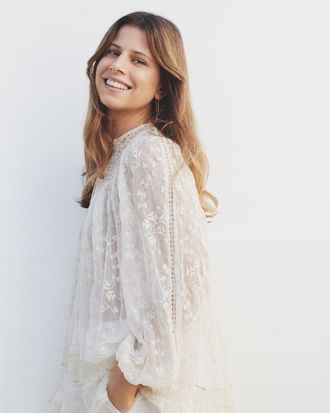
Why Is Your Skin So Good
Do you ever see someone on Instagram and think, Why is your skin so good? We do, so we started asking.
Long before people were talking about the microbiome and searching for the perfect bowel movement in the name of beauty, Carla Oates was aware of the link between the gut and skin. "I had eczema as a child and a teenager, and at about 13, my mom eliminated certain foods from my diet and introduced other foods," she says. "So from a very young age, I saw the connection between what we put into our body and our skin." But it especially hit home when her own daughter experienced eczema at the age of 10 and she stumbled across research that looked at the connection between certain types of bacteria and eczema allergies.
"As I explored that link further, I decided to put my family on a gut-healing protocol. That includes taking some of the digestive irritants and foods that cause a lot of problems for people, like dairy, gluten, corn, and soy, completely out of our diet. We became kind of staunch on it and started introducing more probiotic-rich, lacto-fermented foods. I would make coconut kefir and put it in my daughter's smoothies. I was making her buckwheat porridge in the morning. I tried to incorporate sauerkraut where I could with the kids, which was a little bit challenging because I didn't always love the taste of it," Oates remembers. "And I saw such a huge difference in not only my daughter's skin but her focus — she had some issues with focusing at school." Oates's own skin healed, too.
Then came the deluge of questions asking what she was doing differently. "All I was doing was eating fermented foods," she says. But she received enough inquiries that in 2009, she founded the Beauty Chef, where she creates bio-fermented, probiotic whole-food powders, elixirs, and supplements meant to support gut health, and yes, glowing skin. In the years since, Oates has shared some of her favorite gut-supporting recipes in her books, The Beauty Chef Gut Guide: With 90+ Delicious Recipes and Weekly Meal Plans and The Beauty Chef: Delicious Food for Radiant Skin, Gut Health, and Wellbeing.
Oates recognizes that eating "clean" and incorporating supplements into your diet can be a luxury, but at its core, she says, it's all about going back to the basics. "Don't take supplements if you can't afford to get them. Just go back to trying to really embrace a healthy diet. Your microbiome loves fiber, leafy greens, nuts, legumes — a Mediterranean diet, basically. Take processed foods out. Incorporate bone broths that are rich in connective tissue. Grow a little garden in your yard, put some spices and herbs in it, and make big batches of stews — it can be that simple."
The same goes for your skin-care routine. "I have customers saying, 'I'm using this, this, this, this, this, that supplement, and that supplement, and I'm not seeing any differences. What can I do? What else can I take?'" she says. "But the people that have the best results, they pare it back." After all, she points out, the skin has its own microbiome. "So you've got an ecosystem on your skin, and if you're suffocating it, and confusing your skin with too many ingredients, that causes so many imbalances. Let your skin breathe."
Below, Oates walks us through her go-tos, including the toner that smells like apple-cider vinegar but really works, the face oil that made her skin brighter, and the mineral sunscreen she has been using for years.
The Supplement
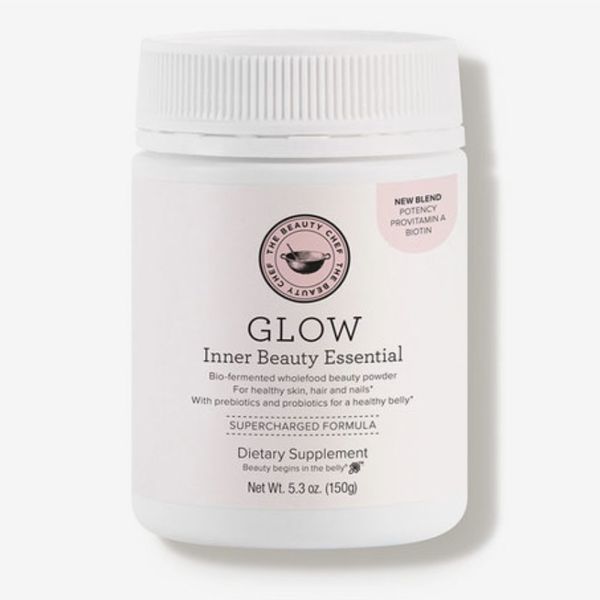
GLOW is a bio-fermented whole-foods powder — fermentation makes all of the nutrients in the ingredients more bioavailable to the skin. This is not just your daily essential skin powder. It's your daily wellness powder. It's amazing for your gut, but we also get incredible feedback from people saying it improves their skin — even hormonal acne. It's great for more lustrous hair, stronger nails, more energy, and a better and happier tummy. We've had people who notice a difference within a week. We also have people who might have some hormonal acne, and it can take up to a couple of months — we've got some incredible before-and-afters.
We've got lots of different types of bacteria in GLOW — that's the base of all of our products — and then to make them even more potent and efficacious, we add medicinal herbs. In the powder, we have broad-spectrum B vitamins from sprouted quinoa, biotin, and niacinamide, which is important for skin structural integrity. We have provitamin A from fermented microalgae that is grown in Western Australia, and we know that provitamin A is really important for skin cellular renewal. It's super-rich in polyphenols and antioxidants that are really important for supporting gut health.
I love it with water, and it's great in a smoothie — it makes every smoothie tastes delicious. Berries and plums have a rosy note, so you do get some of that, but it's primarily berry-flavored. We've got maqui berries in there, and they have higher levels of antioxidants than blueberries, and we've also got grape skins in there. We've got Kakadu plums, which are Australian plums that have been used for thousands of years in Aboriginal culture for their medicinal benefits.
I'll follow it with our COLLAGEN Inner Beauty Boost, a bio-fermented, probiotic elixir. It doesn't actually contain real collagen but supports your body's ability to make it and slow down the degradation of existing collagen. Inflammation and oxidative stress are some of the main drivers of the breakdown of collagen, so we've got a host of anti-inflammatory ingredients in it, and it's super-rich in antioxidants, too.
I love concocting things. I wrote a book in 2002 called Feeding Your Skin. It's basically a recipe book for skin care — I've made cleansers, moisturizers, and fresh food masks for years. Now oil cleansers are very in vogue.
I use lots of different oils depending on what I've got in my cupboard, but often, I make a combination of jojoba, apricot, and almond oils — I generally don't put more active oils like rosehip in there because you're taking it off anyway. And if I run out of oils, I even just use the olive oil that's in my kitchen.
The type of oil you should use on your skin really depends on your skin type. So, for example, if I had really oily skin, I would not use olive oil to cleanse. But my skin is kind of combination and gets dry in areas, so olive oil will be completely fine for me. I will say that I'm such a big believer in people that have really oily skin doing oil cleansing. Lighter oils like jojoba are really effective because when you strip your skin of oil, it sends a message to the brain to produce more oil, which then sends your oil glands into overdrive because they're like, Oh my God, I need to go into production. So cleansing with oil tricks your brain into thinking you've produced enough oil — you just need to make sure that, if you've got really oily skin that's congested and prone to breakouts, you remove it with a warm muslin cloth.
The Exfoliating Toner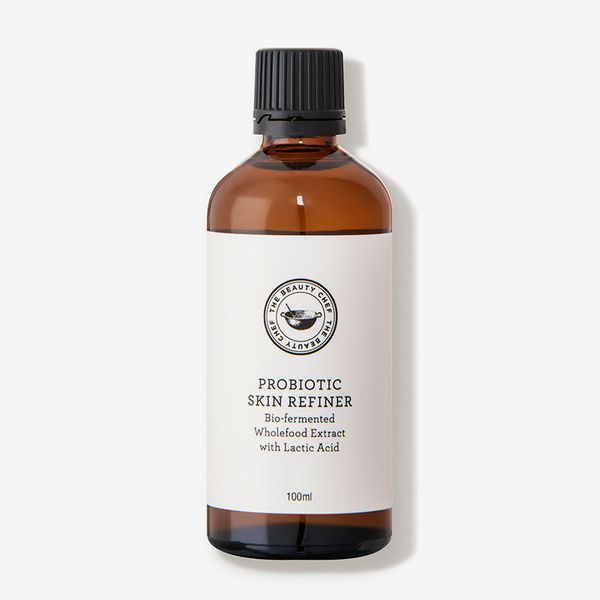
This is a really cool product. I think because we're known as an ingestible brand, people forget about it. Occasionally, I will write an email to our team going, "Guys, do not forget about the Probiotic Skin Refiner. It's a game-changer!"
Basically, it's a bio-fermented whole-food extract — it's the liquid that comes from the fermentation of our powders. It's got a low pH of 3.5, so it's naturally exfoliating, and that's because of the lactic-acid fermentation. And you know, lactic acid is also an alpha hydroxy acid (AHA), so it helps to not only increase cellular turnover but also synthesize collagen and increase natural moisturizing patches in the skin.
After I wash my face, I pat it all over with a muslin pad soaked in it. The only thing I would say is that because the Probiotic Skin Refiner is an AHA, make sure that you're putting an SPF on after, especially if you're going outside.
The reason that I never brought it out when we first started the Beauty Chef is hilarious. I had this incredible, nutrient-dense extract that was coming off the fermented foods. I was bottling some of it, and then we were disposing of the rest of it, which was such a waste. But I was using it on my skin, and my friends and family wanted to know what my routine was. I said, "Look, I'm using this stuff, but it smells really bad." They got really annoyed with me because once they started using it, they were like, "I don't understand why you don't put this out in your product range." I said, "Because it smells like apple-cider vinegar 'cause it's fermented. It's got a really strong scent." They were like, "We don't care: It works. It's amazing. Give us more." One reviewer actually said, "My husband goes, 'Oh my God, what is that smell?' I was lying in bed next to him." But genuinely, if you put a cream on top of it, the smell dissipates within seconds, and because it's so effective, people just don't seem to care.
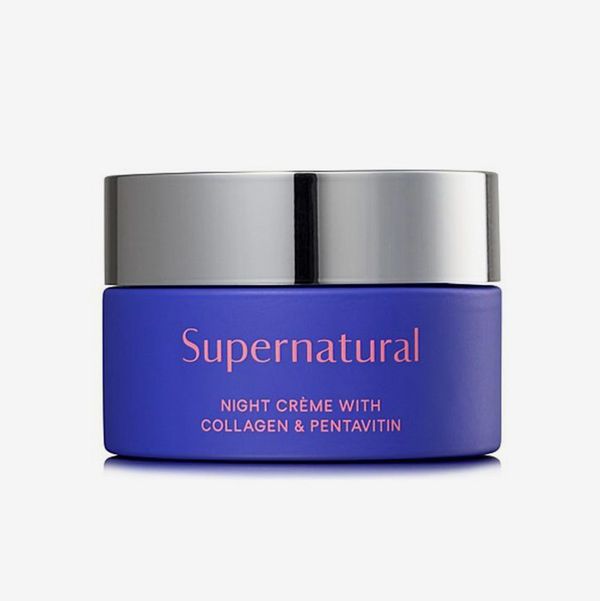
I do moisturize a bit more as I'm aging. I'm predisposed to eczema. Since I began paying attention to my gut, I haven't had a really bad eczema breakout for like 20-something years, which is amazing, but I do genetically have dry skin. My son and I were talking about it the other night. Like, my mom had really scaly legs, and now both of my kids are prone to eczema as well because my husband has eczema, so they got a double whammy of being predisposed to really dry skin.
Emma Lewisham's a New Zealander, and I have just been introduced to her. She's focused on sustainability and generous with sharing information about her journey and how she is moving toward truly sustainable packaging. And not only that, but her products are highly efficacious. They're rich in natural botanicals. This is called the 72-Hour Crème, and I've really noticed that my skin looks so much plumper. It really does give my skin that kind of dewy radiance that I love — I don't mind that feeling when I put on some oil and then I put on a really beautiful moisturizer that makes my skin kind of shiny and dewy; I much prefer that to feeling like my skin is cracking. It's got a lovely smell; it's very subtle, a little bit soapy. It's sort of old-fashioned but vegan and cruelty-free.
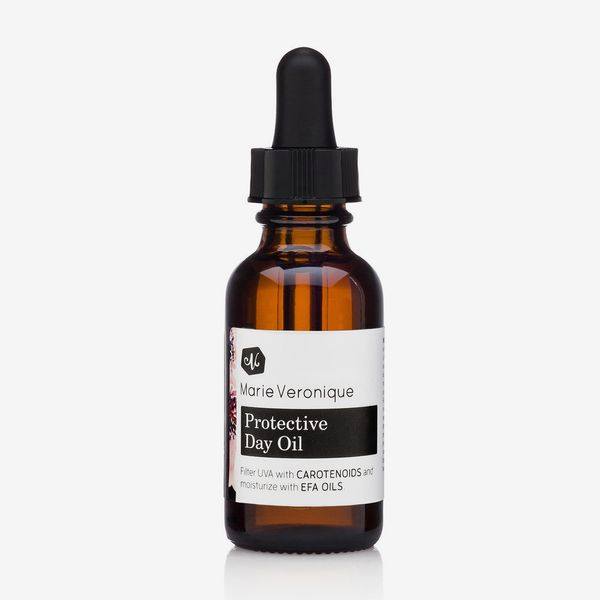
I love Marie Veronique's story — her daughter's a scientist, and they did the range together. Her products have lots of really amazing natural ingredients, but they're also highly active. In this oil, specifically, I love the combination of high-performing actives with carotenoid antioxidants, which are amazing for protecting the skin from free-radical damage and helping to prevent collagen from degradation. It's also rich in essential fatty acids, which are crucial for maintaining and building a healthy skin barrier. I'll alternate it with Sunday Riley's C.E.O. Glow Vitamin C + Turmeric Face Oil (below).
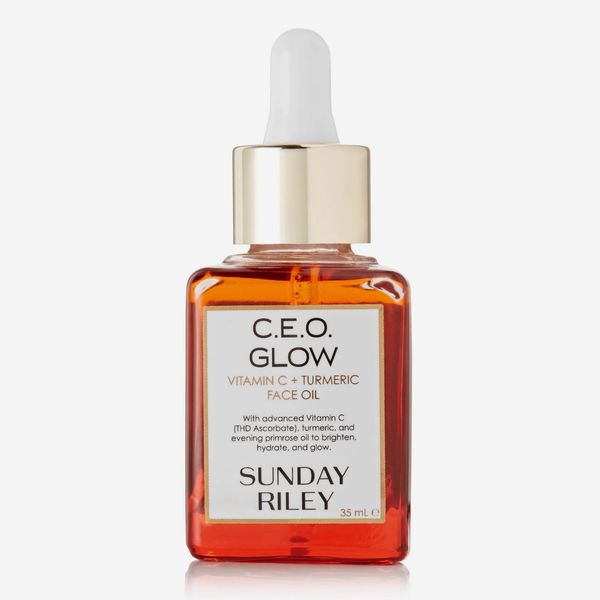
I love vitamin C, and I love turmeric — they're both anti-inflammatory. I definitely noticed a difference in my skin tone and texture with this. They're brighter and smoother. It's a really beautiful oil.
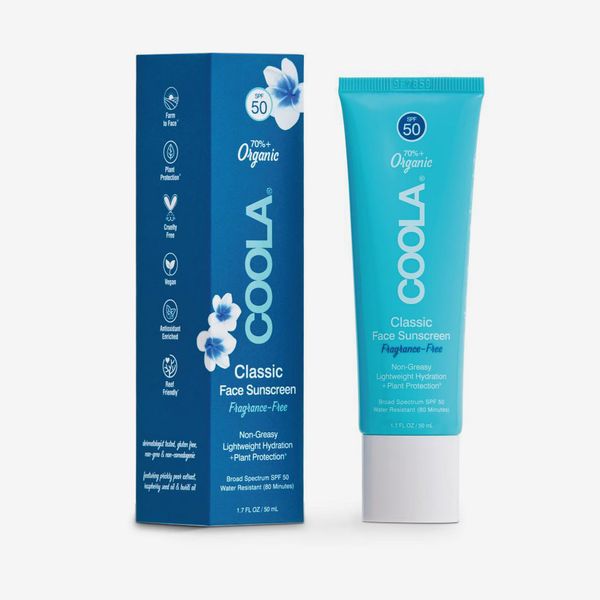
I used to put coconut oil — it was called Reef Oil — on as a teenager and bake my skin. And I saw a facialist, I think was in my early 20s, and she said, "Carla, you've got some sun damage." So I became much more conscious about sun protection, but I grew up in Australia in the '70s. And, oh my gosh, my mom was always out in the sun with her Reef Oil on as well. I will say that vitamin D is also really good for your skin, your immune health, and your bone health, and that a percentage of the world's population is deficient in vitamin D, but let's find that balance between getting enough and protecting ourselves.
I've been using mineral sunscreens for a long time — I prefer ingredients like zinc oxide that physically protect you from the sun. But the problem with a lot of physical blockers is that they make your skin look white. Sometimes my husband at the beach will be like, "Oh my God." Especially when you're going out to work, you don't want to look like you've got this white face. So what I love about this Coola sunscreen is that it's really smooth and it dissipates. You don't notice it, and it's such a great experience. It's also fragrance free.



Comments
Post a Comment